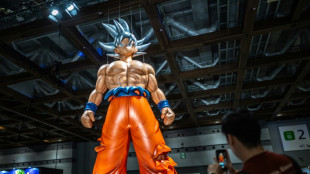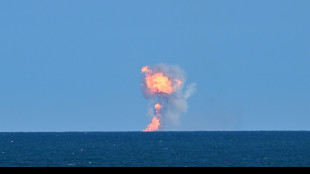
-
 Asian markets fluctuate as traders weigh geopolitical tensions
Asian markets fluctuate as traders weigh geopolitical tensions
-
'An inauspicious day': the landmines ruining Myanmar lives

-
 UN to vote again on Gaza ceasefire, US plans unclear
UN to vote again on Gaza ceasefire, US plans unclear
-
Japan's manga powerhouse 'Dragon Ball' turns 40

-
 Japanese, Koreans bottom of global love life survey
Japanese, Koreans bottom of global love life survey
-
Son blames 'mistakes' after South Korea held by Palestine in qualifier

-
 Japan ramps up tech ambitions with $65 bn for AI, chips
Japan ramps up tech ambitions with $65 bn for AI, chips
-
Lights, action, melodrama! Silent films get new reel at London haven

-
 Myanmar led world in landmine victims in 2023: monitor
Myanmar led world in landmine victims in 2023: monitor
-
ICC to sentence Timbuktu war criminal

-
 Ugandan opposition figure Besigye 'kidnapped', says wife
Ugandan opposition figure Besigye 'kidnapped', says wife
-
Australia's Jason Day eyes more major glory after resurgence

-
 Machu Picchu security boosted after visitors spread human ashes
Machu Picchu security boosted after visitors spread human ashes
-
Popovic hails Australia character in 'crazy' World Cup qualifier

-
 Taliban govt clearing 'un-Islamic' books from Afghanistan shelves
Taliban govt clearing 'un-Islamic' books from Afghanistan shelves
-
Argentina beat Peru as Uruguay hold Brazil

-
 Asian markets struggle as traders weigh geopolitical tensions
Asian markets struggle as traders weigh geopolitical tensions
-
Tatum stars as Celtics end Cavaliers unbeaten start

-
 Hurting India under pressure in blockbuster five-Test Australia series
Hurting India under pressure in blockbuster five-Test Australia series
-
'They killed her dream': Israel strike leaves woman footballer in coma

-
 Iraq holds its first census in nearly 40 years
Iraq holds its first census in nearly 40 years
-
Iraqis face tough homecoming a decade after IS rampage

-
 Russian net tightens around last civilians left in eastern Ukraine
Russian net tightens around last civilians left in eastern Ukraine
-
Olympic champion Tebogo aims to inspire next generation of African athletes

-
 Valencia on target as ten-man Ecuador upset Colombia
Valencia on target as ten-man Ecuador upset Colombia
-
'Rust' to premiere three years after on-set shooting

-
 Strike at French cognac maker Hennessy over measures in China spat
Strike at French cognac maker Hennessy over measures in China spat
-
Xi, Lula meet in Brasilia to 'enhance ties'

-
 SpaceX fails to repeat Starship booster catch, as Trump watches on
SpaceX fails to repeat Starship booster catch, as Trump watches on
-
'I have left a legacy': Nadal retires from tennis

-
 US recognizes Venezuela opposition's Gonzalez Urrutia as 'president-elect'
US recognizes Venezuela opposition's Gonzalez Urrutia as 'president-elect'
-
European powers, US seek to censure Iran at UN nuclear watchdog board

-
 UNAIDS chief says husband, Ugandan opposition figure Besigye, 'kidnapped'
UNAIDS chief says husband, Ugandan opposition figure Besigye, 'kidnapped'
-
Nadal's sensational career ends as Netherlands defeat Spain in Davis Cup

-
 US announces talks with Israel over civilian casualties in Gaza
US announces talks with Israel over civilian casualties in Gaza
-
SpaceX fails to repeat Starship booster catch, as Trump looks on

-
 G20 summit ends with Ukraine blame game
G20 summit ends with Ukraine blame game
-
Trump appoints TV celebrity 'Dr. Oz' to key US health post

-
 European stocks fall on Ukraine-Russia fears, US focused on earnings
European stocks fall on Ukraine-Russia fears, US focused on earnings
-
Last-gasp Szoboszlai penalty rescues Hungary draw with Germany

-
 Germany, Netherlands draw as Nations League group stage ends
Germany, Netherlands draw as Nations League group stage ends
-
Hong Kong tycoon Jimmy Lai takes witness stand in collusion trial

-
 Guardiola set to extend stay as Man City boss - reports
Guardiola set to extend stay as Man City boss - reports
-
Minnows Botswana hold Egypt to qualify with Mozambique, Tanzania

-
 Inter Miami coach Martino leaving club for 'personal reasons' - club source
Inter Miami coach Martino leaving club for 'personal reasons' - club source
-
Chinese man sentenced to 20 months for Falun Gong harassment in US

-
 Hong Kong court jails 45 democracy campaigners, drawing condemnation
Hong Kong court jails 45 democracy campaigners, drawing condemnation
-
'I did it for Rafa': Alcaraz after keeping Spain Davis Cup dream alive

-
 Alcaraz keeps Spain and Nadal Davis Cup dream alive
Alcaraz keeps Spain and Nadal Davis Cup dream alive
-
Trump names China hawk Howard Lutnick commerce secretary


Ukraine invasion places sharp new focus on calls for UN reform
The long-simmering debate over UN reform -- and particularly over the role of the Security Council, which does not represent today's world and which failed to prevent Russia's invasion of Ukraine -- has suddenly become acute.
Recently Ukrainian President Volodymyr Zelensky, in a blistering call for the UN to exclude Russia from the Security Council, asked bluntly, "Are you ready to close the UN" and abandon international law. "If your answer is no, then you need to act immediately."
And after the Security Council failed to prevent the brutal invasion of his country, he said in a separate address to Japanese lawmakers, "We have to develop a new tool" capable of doing so.
Created in 1945 with a vision of guaranteeing world peace and preventing a World War III, the United Nations conferred disproportionate power on the five permanent, veto-wielding members of the Security Council -- the US, Russia, China, Britain and France -- in a way that allows them to protect their own interests while keeping a heavy hand in world affairs.
Thus, since 2011, Moscow has exercised its Security Council veto some 15 times in votes regarding its ally Syria.
But the veto power also guarantees that Moscow can never be removed from the Council, since the UN Charter's Article 6 allows the General Assembly to exclude a member only ... upon the recommendation of the Security Council.
In that vein, the US and Britain invaded Iraq in 2003 without UN approval -- and without suffering any consequences for their permanent seats on the Security Council.
Beyond the veto question, and the lack of international balance among Security Council members -- no African or Latin American country holds a permanent seat -- the Council grants a near-monopoly on some issues to Washington, London and Paris.
The division of roles among the 15 Security Council members is uneven, according to the ambassador of one of the current 10 non-permanent members. The latter group, elected for two-year terms, is "given the bureaucratic jobs."
"We don't think it's a fair division of labor," the ambassador said, speaking on grounds of anonymity.
The Council has been widely denounced for its current -- and recurrent -- paralysis, with even UN Secretary-General Antonio Guterres deploring its failures.
"There's a pretty fundamental problem there," US Secretary of State Antony Blinken admitted, a day after Zelensky's futile call for Russia to be expelled.
- 'Like cholesterol' -
To Bertrand Badie, a Paris-based international relations specialist, the United Nations is "like cholesterol": "There is the good," notably in the humanitarian aid the UN dispenses that saves lives around the world, and "there is the bad, with the Security Council."
But the ambassador, while conceding that there has been "intense criticism" of the world body, added: "Where would we be if we had none of that?" -- none of the "good" carried out by the UN.
Most proposals for reform call for the enlargement of the Security Council -- adding both permanent and non-permanent members.
But "positions are very polarized," the ambassador said, as to which nations might be added and which would enjoy veto power.
"The veto has to be a bit more disciplined," the diplomat said, adding that the point of it should not be "to block progress" but to "force the five permanent members to sit down and arrive at a solution acceptable to all."
At an informal meeting Friday on UN reform that included the five permanent members, the veto issue was again raised.
Among the ideas advanced: a French-Mexican proposal to limit its use in cases of "mass crimes," and a suggestion from Liechtenstein that would require any nation casting a veto to explain it before the General Assembly.
On Thursday, South African President Cyril Ramaphosa, whose country hopes someday to join the permanent members of the Security Council, said that "the entire peace and security architecture of the United Nations needs to be overhauled."
The Council, he said, needed to be "democratized" to allow the world body to "move beyond the paralysis brought about by a few member states."
Other potential permanent members of the Council include major world players India, Japan, Brazil and Germany.
But several experts say the chances of reform will remain slim so long as the permanent members refuse to accept any dilution of their power.
R.Chavez--AT
